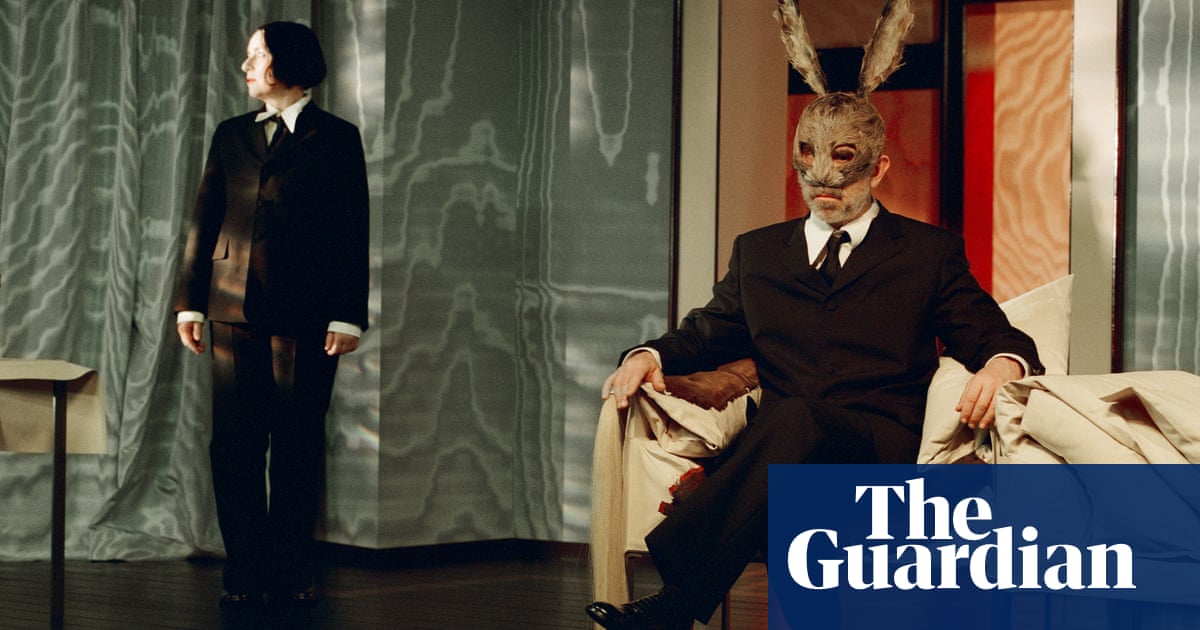Two years ago,Deborah Levycame across a cartoon that sparked her imagination. It featured a Freud-like figure sitting opposite a rabbit on an analyst’s couch. Levy, a three-times Booker nominated novelist and award-winning author of nonfiction, had began her career as a playwright but had not written a script for 25 years until she came across the image. “As soon as I saw it,” she says, “I heard dialogue in my mind: a conversation, a serious, difficult conversation between a professor and a rabbit, about contemporary anxiety. I knew it was a play,” says Levy.
The premise may seem absurd but that is precisely the point – absurdism is a way of dealing with themes that have proved, in the wider world, divisive and even explosive to debate. Because the two-hander includes a rabbit, it makes space for humour, for misunderstandings.
The play that came out of that impulse, 50 Minutes, had a sold-out run at Theater Neumarkt in Zurich earlier this year and will have its second run next month. The drama takes place over a therepeutic hour and explores – in English, rather than German – everything from anxiety and panic to the fearful silence around a subject matter deemed taboo, albeit all of it in metaphorical or approximate ways.
Levy’s subtitle for this work is “The War War, Jaw Jaw, Bunny Play” and the rabbit pointedly speaks of aggression, fear and violence: “A fox can kill four generations of my family,” he says, “but he cannot kill my desire to be free.”
While Levy was writing the play, the world seemed to be moving towards a narrative of war, she says. “I didn’t want to pin the play on one conflict, though of course Gaza and Ukraine were on my mind, it’s more about a collective feeling of immense unease, queasiness, disbelief, shock, uncertainty, fear and sadness. So Rabbit was going to be put to work as the transmitter of all of this.”
It clearly resonates with audiences: its first run required extra seating in the auditorium to accommodate the enormous demand, with audiences sitting along the stairs when the seats ran out. Levy was there and relished feeling the buzz in the room. “On the first night,” she says, “sitting alone in the dark with the audience, I thought I might have a heart attack. After all, I am not in the same room as my readers when they throw my books at the wall, or when they laugh or cry at something on the page.”
Starring Susanne Sachsse as Professor, and Hauke Heumann as Rabbit, the drama is both a playful and unsettling experience to watch. It incorporates music and dance (the choreography is designed to resemble the dance sequence in Jean-Luc Godard’s 1964 film Band of Outsiders, says Levy). The play’s aesthetic chimes with Levy’s liking for European avant-garde theatre, she says, but influences beyond it also include “a mix of vaudeville and David Lynch”.
There is a layered set, suggesting rooms off-stage, alongside a couch and Dali-esque lobster imagery. Heumann wears a rabbit mask and vapes occasionally while Sachsse cuts an androgynous figure in a suit and tells her client that he should say whatever comes to mind. The rabbit duly speaks about intruding thoughts, which are simultaneously other-worldly and of our world, He tells the professor of his fear of sugar and adds: “I must stop scrolling the news.”
Despite Levy’s early career working for the Royal Shakespeare Company among others, and serving as the artistic director of the Man Act theatre company, a radical initiative based in Cardiff, she had to get used to the medium again. “It took me a few weeks to get into the flow of the writing,” she says. “At first the words on the page were a bit tight, too didactic, not free enough. Then I started to understand its rhythm and structure.”
The play was commissioned by Tine Milz, Theater Neumarkt’s outgoing co-artistic director, who first met Levy in Rome in 2023. They discussed a collaboration and Levy sent Milz the cartoon soon after. “She said this could be the basis for our project,” says Milz. “From that point on, we thought about what the professor and the rabbit’s discussion could be. We talked about world politics and art … but mainly about a world that is fucked.”
Most of all, Milz wanted a piece that would address the prevailing sense of unease. “There is a crack in our world and a panic – a sense, in Europe certainly, that the peaceful times are over. But it’s panic combined with a feeling of numbness – that ‘I can’t do anything so maybe I’ll just party or look away because I’m completely overwhelmed.’” Milz, who is German-born and part of a trio of female artistic directors at Theater Neumarkt, hopes to tour the play across Europe.
It is relevant to all that is going on across the continent, she reflects, from the rise of Alternative für Deutschland (AfD) in Germany to the election of right-wing prime minister Giorgia Meloni in Italy to the post-Brexit landscape in the UK.
It is the duty of theatre, she adds, to interrogate difficult subjects, although she is seeing growing censorship in some quarters of her industry. “I feel in the world of the arts that people are not talking with each other any more because they have different opinions on things, but I think that’s a problem. We can disagree on a lot of things but we have to continue talking and trying to understand each other.” This play, in what it says but also in its gaps and its opacities, is attempting to breach difference and also highlight it, she suggests, with, as Levy says, “something that is both painfully real and subversively absurd”.
Arifa Akbar’s trip was paid for by Theater Neumarkt
50 Minutesis at Theater Neumarkt, Zurich, from 4 to 7 May
